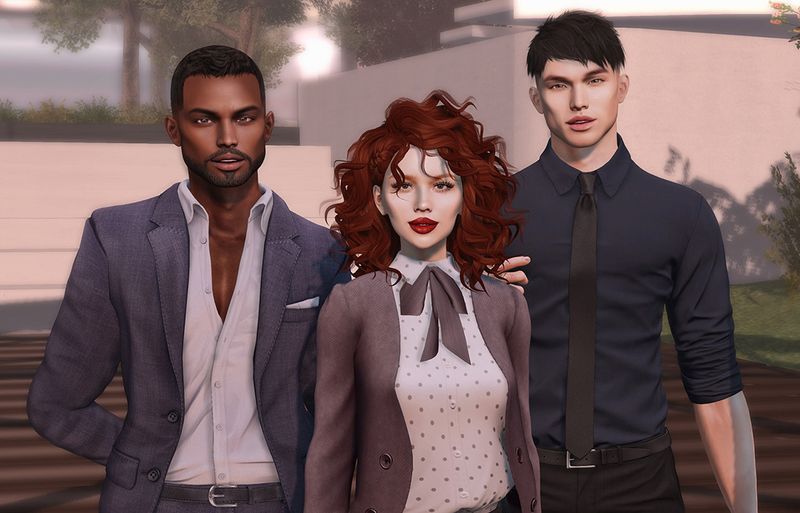Source: Linden Labs
This blog’s title is derived from the Star Trek Original Series episode entitled “Shore Leave” (Season 1, Episode 15). The crew beams down to a planet that appears to be an idyllic natural paradise, perfect for some rest and recuperation, though soon they begin to face a multitude of bizarre out-of-time-and-place beings, such as the white rabbit from Alice in Wonderland, as well such dangerous opponents such as a Samurai warrior, a tiger, and a strafing Japanese fighter plane.
In the end they learn the planet is an amusement park for an advanced civilization, where telepathic thoughts lead to real, but safe, adventures.
CARETAKER: This entire planet was constructed for our race of people to come and play.
SULU: Play? As advanced as you obviously are, and you still play?
KIRK: Yes, play, Mister Sulu. The more complex the mind, the greater the need for the simplicity of play.
As our society becomes more complex, the need for play increases to compensate for the resultant drudgery. Humans were never intended to be robots.
Electronic games run on a variety of platforms like consoles, computers, mobile devices. There is a game for everyone whether it is MahJong, Fortnite, Call of Duty, or Candy Crush. Games can be puzzles, real-time strategy, first person shooter and sports, not to mention the all-powerful Massively Multiplayer Online Role Playing Game (MMORPG).
Many people I know burned up years playing World of Warcraft. The Big Bang Theory’s Raj Kutharapli didn’t call it “the MMORPG monkey on your back” for nothing! MMORPGs really can be as addictive as heroin.
Some people view gaming as a waste of time.
And yes, there are people who become so addicted that they do little else. We’ve heard the horror stories of parents neglecting children simply to get more game time. There are people who become obsessed and literally let themselves go, physically and mentally just to keep gaming. South Park did a great spoof on this when the kids’ health and skin deteriorated as they became more and more addicted to World of Warcraft.
A New Game That Wasn’t A Game Emerged
In all of this emerged a new type of game that in many ways would have more impact on the future and how we might live than anything prior. It wasn’t even a game in the traditional sense. It had no objectives and no conflicts, other than ones created by the inevitable conflicts stemming from human interpersonal dynamics. More on that later.
This game was Second Life, developed by Linden Labs, a technology company founded in 1999 by CEO Philip Rosedale, a Caretaker in his own right. Second Life transformed what we knew about virtual worlds. At its height in 2013, it was basically a massive world where you could:
- Roam free via teleportation
- Rent or buy land
- Have an avatar (a digital representation of yourself)
- Live out the fantasy life you always dreamed of
- Shop online or in game stores
- Buy clothing, houses, jewelry, furniture and pets
All the while, interacting with millions of other players all over the world.
Nothing I write will do it justice. You would have to experience it to truly understand its magnitude. People built cities in the clouds that you could visit, fantasy worlds you could explore.
The only limitation was your imagination and of course, originally, the dreaded “prim count.” Meaning primitives, which were the building blocks of the world, of which you could only have so many per area. Although, to be honest, it didn’t impact the designs much.
You wanted to live in a castle? No problem. Beach house? No problem. Even wealth was easy, since Second Life used its own currency, and the Linden Dollar went a long way.
People even had islands where they built entire worlds derived from literature, fantasy, and science fiction universes. Many, though, just wanted to create a life different from their own.
There were also people who made quite a bit of real dollars in the game. Buying and selling real estate and renting the purchased islands out to residents. You see, you could own a private island for about $250 USD a month which you could parcel up and charge rent for, turning a real profit.
Everyone was Beautiful and Anonymous

What’s more, because you could look however you wanted and dress however you wanted, it came as no surprise that outside of the more odd-looking avatars, most people were thin, young, well dressed and gorgeous. Skin color and race did have variety and having a tan or darker skin was very common. The whole idea was Star Trek’s Holodeck where you assumed a virtual role in a virtual world.
The best part of this, and remember this for later, was anonymity. No one had any idea who you were in RL (real life) unless you shared that info with them. Better yet, you could even get married or partner up with someone officially by having their name on your profile, etc. This feature, coupled with teleportation, meant you could be next to your love in seconds.
Remember how I mentioned earlier that “interpersonal dynamics” came into play? You’re about to find out why.
A fantasy land of rich, beautiful people, living in huge fantasy houses all connected to each other. What could possibly go wrong?
Love without Cost
“Love is a fire. But whether it is going to warm your hearth or burn down your house, you can never tell.”
– Joan Crawford
One thing that went very wrong was that people began creating romantic relationships in Second Life that were colliding with their real life relationships. Getting into a relationship in Second Life was as easy as going to the kitchen to get a glass of water. Walk up to someone, talk, and soon you are snuggling on the beach together.
And why not? You didn’t have to see what they really looked like, what they dressed like, what their eating habits were, or what their houses looked like. It was just a stunningly hot looking avatar and their personality. Not only that, but in the early days you could only communicate using chat, so you didn’t even have to hear their voice. As long as you liked them as a person, all was well.
It gets very easy to like someone when everything that normally causes friction, like money, in-laws, family, friends, exes, jobs, and every other force that affects a real relationship is simply not present. The problem with this was that it was just as easy to get out of a relationship as it was to get in. Or to get involved with multiple players at the same time.
With a couple of clicks, you could pack up, or simply change the admin privs on your house to ban your former one true love. What’s more, once removed from your friends list, they would no longer know where you were in Second Life, unless you shared friends in the game or went to the same spots. You pretty much became a ghost.
Coupled with how easy it was to be unfaithful to your avatar lover, this created some pretty crazy nights, where you might sit for hours to console an avatar friend who just divorced her virtual husband after catching him cheating with another avatar. The tears were not virtual; they were very real.
From Second Life to Real Life
All too often, relationships escaped from Second Life to invade real life.
Although there are wonderful stories of people meeting and marrying in real life after meeting in Second Life, there were also meetings in real life that created real life divorces. It really was not Second Life’s fault; Linden Labs had rules about bullying and stopping illegal activities. Linden even had their own group of people roaming through the virtual world and keeping an eye on things. Unfortunately, for many, the online world was like handing unlimited candy to kids. They sometimes ate until they got sick.
Slow Dancing on a Beach
As you read this about Second Life, you might see this as humanity running amok, but there was another side, a really beautiful side:
- Slow dancing on a beach, dressed in your tux with your sweetheart in her ballroom gown
- Hanging out with friends from all over the world, in a French café, while listening to a guitar player perform live from his apartment in Spain
- Exploring reconstructions of the world’s most beautiful places
- Sharing real life issues that were bothering you with your online friends
- Sometimes just sitting by yourself and staring at the surf.
I think one of my most profound moments was when I met a woman who was severely disabled and chatted with her; you did quite a bit of chatting in SL. Friendships happened very fast. She explained that she couldn’t really do anything because of her disability and that Second Life gave her something she dreamed of, the ability to walk, travel and live the way she couldn’t in real life. It was beautiful to hear this.
Second Life Will Always be the Pioneer
Second Life was the pioneer. The idea that there is no game, just a place to get away and live a different life. Then the world changed. Very much like Martin Scorsese’s film “Casino” when Ace, played by Robert DeNiro, laments the change that took over Las Vegas from the early days. Like Las Vegas, the world’s largest tech corporations have already arrived to stake their claim. Microsoft, Google, Meta.
“The town will never be the same. After the Tangiers, the big corporations took it all over. Today it looks like Disneyland. And while the kids play cardboard pirates, Mommy and Daddy drop the house payments and Junior’s college money on the poker slots.”
– Ace Rothstein. “Casino“
What Made Second Life Different
Second Life had one thing going for it. It was about anonymity. The new systems won’t be. Being free like the early days of the Internet, before every click creates a data point in your digital soul. We went from anonymous freedom to being a rat running through a maze with companies trying to figure out what kind of cheese to sell you.
Second Life was not a Blade Runner-esque bombardment of the world’s largest brands fighting for your eyeballs. Where you roamed didn’t result in targeted advertising. If you mentioned in chat to a friend you had an itch, no one would start pushing on you, banner ads for a cream.
You were left alone. It was a world that belonged to you, and everything you saw was, for the most part, built by people just like you. That was always Philip Rosedale’s true genius. Give a place where you can build your own world and live the life you dream of living and stay out of the customer’s way.
Escape for Just a While
Regardless of monetization, the whole idea of the future will be the desire to escape the world and forget about our ordinary lives just like on Star Trek’s “Shore Leave ”. A place where we don’t have to be ourselves, and can be someone else for just a while.
But while we could be escape from our realities, we still couldn’t escape from ourselves.


0 Comments